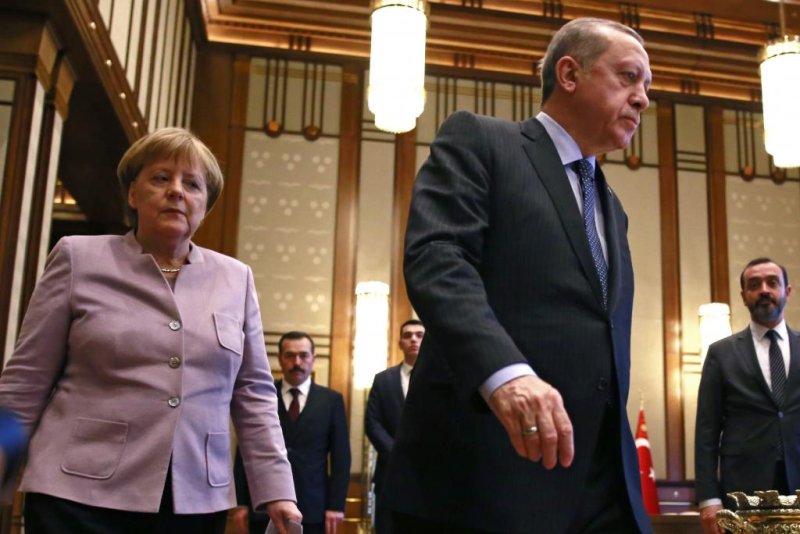Germany Blocks Defense Exports To Turkey In "Worst Crisis Since World War II"

Zero Hedge,
20 July, 2017
The "worst crisis between Germany and Turkey since World War II" just took another turn worse, after German media reported that in the latest escalation to date between Berlin and Ankara,
Chancellor Angela Merkel will freeze present and future Turkish orders of defense goods
amid souring diplomatic relations between the two nations, Bild Zeitung said citing unidentified govt officials.
This
effective trade embargo comes just hours after Germany’s issued a
safety warning to tourists traveling to Turkey and warned investors
against doing business there. As discussed
this morning,
in unusually bold language Germany's foreign minister Sigmar Gabriel
announced a “re-orientation”
of German policy towards Turkey, saying Berlin would reconsider the
economic aid and export credit guarantees it provides for the
country.
“We
can’t go on as before,” he said at a press conference. “
We
have to be clearer than before so the authorities in Ankara
understand that their policies are not without consequences.”
As
the FT
adds,
"the measures will have a tangible impact on a country that
welcomes millions of German tourists every year and is one of
Germany’s closest trading partners.
Germans
make up 15% of the country’s tourism arrivals and trade volumes
between the countries stand at €37bn a year."
And,
as relations between the two NATO members "slumped to their
lower since World War II", Turkey’s Foreign Minister Mevlut
Cavusoglu responded saying his country wouldn’t give in to what he
said were German threats. "Germany
knows very well that the Turkish people have never bent in the face
of any threats or blackmail,”
Cavusoglu
said. “We will evaluate these threats made to us with the same
state seriousness and we will of course respond.”
“This
is the worst crisis between Turkey and Germany since World War II,
when Turkey and Germany took their places on the opposite camps even
though Turkey did not enter the war,”
Huseyin
Pazarci, a professor of international relations who lectures at Near
East University in northern Cyprus, said by phone from Ankara. While
“political and trade relations with Germany have been steadily
improving since it began receiving Turkish workers in 1960s, the
latest breakdown in relations will be an adverse impact for both
Germany but mostly Turkey.
Commenting
on today's events, Citigroup is surprised that Turkish assets, and
especially the USDTRY haven't reacted most strongly to the news,
although the bank notes that the market seems to be keeping a laser
focus on selling USD behind its own political uncertainty.
Still,
Citi's traders see it as significant development as Germany is
Turkeys biggest export market so "re-orientation" could
have large impact on the Turkish economy.
Citi
also highlights the guidance it issued on Wednesday after a cabinet
reshuffle in Turkey, in which it said that "the risk of an
unwarranted monetary policy easing and the possibility of more
interventionist/unorthodox policies cannot be ruled out in the event
of a slowdown in economic activity once the impact of expansionary
policies fade away. Against this backdrop, we believe that market
participants will be monitoring the noted risks closely and remain
particularly sensitive to policy slippages."
Curiously,
while "market participants" are monitoring for the "noted
risks" they appear completely oblivious when it comes to today's
far more serious news. Finally, if indeed this is the end of
German-Turkish diplomatic relations, keep a close eye on the
possibility of Erdogan using the "nuclear option"and
releasing some 2 million Syrian hostages currently contained inside
Turkey's borders, on their merry way to Germany, and the next crash
in Merkel's approval rating, not to mention yet another European
refugees crisis.



No comments:
Post a Comment
Note: only a member of this blog may post a comment.